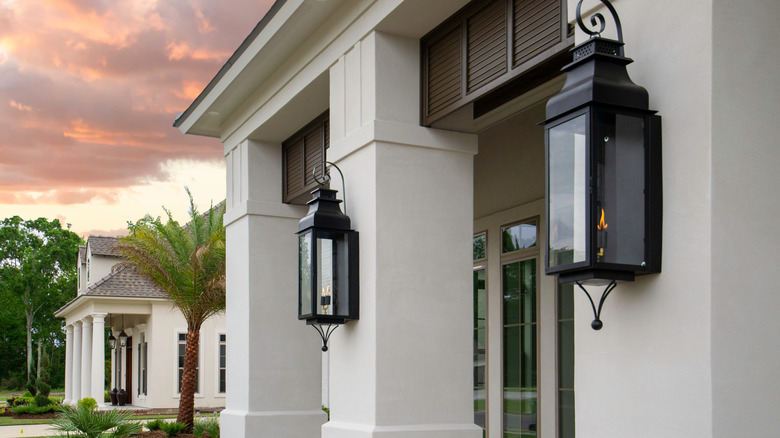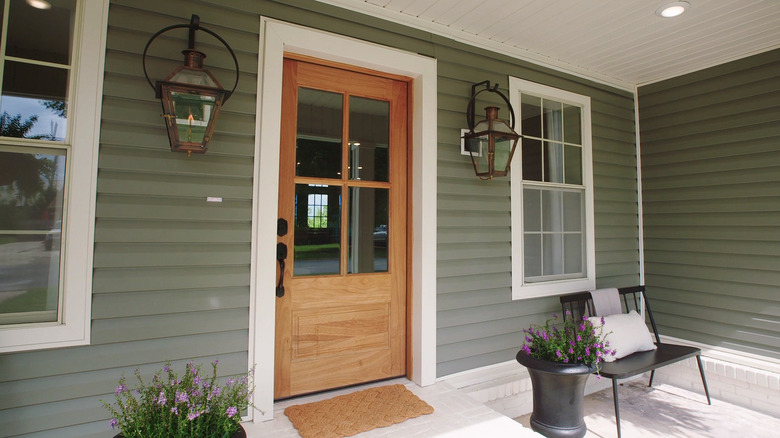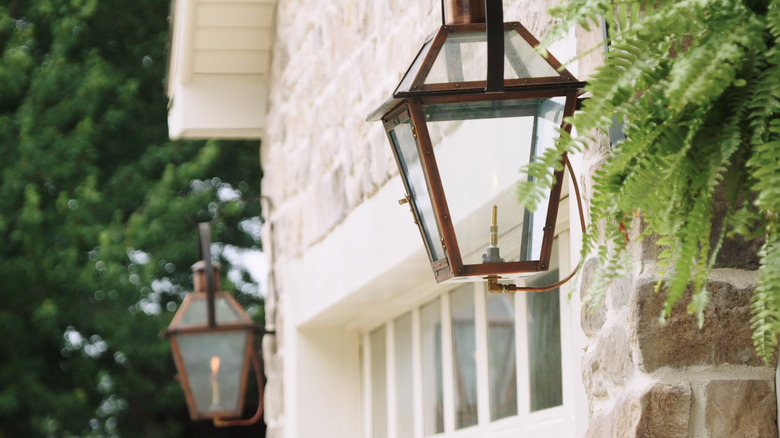Dave And Jenny Marrs Explain The Pros And Cons Of Installing Gas Lanterns To Your Home's Exterior
When family friend Sophia Lacy moved back to Bentonville, Jenny and Dave Marrs wanted to give her the English cottage-style feel she was looking for in her first house. As shown in the Season 5 premiere of "Fixer to Fabulous," part of that –- a big part, it turned out –- was adding gas lanterns to the front of the home: two lanterns mounted high next to the garage door and two lower by the covered, newly centered entry door. Jenny strongly prefers the authentic flicker of gas lamps, but Dave pointed out that it would cost around $1,500 to install the necessary gas lines, versus about $60 to run the cable necessary for electric versions. "I love hearing that Sofia wants to lean in to her time spent in England," Jenny said in the episode. "She wants this home to feel like an English cottage." And the Marrses wanted that for her, and ultimately found the budget for it.
There are good reasons to prefer gas to electric outdoor lighting. They don't attract insects like electric lights do, for example. And they're useful in the event of an electrical outage, which makes them convenient and more secure. But the reason most prefer gas lanterns is that they have an enormous aesthetic edge over electric lighting that overcomes some of gas' shortcomings. This is why Jenny Marrs believes gas lighting will make your front door more inviting.
Installing gas fixtures can be expensive
The biggest shortcoming of gas outdoor lighting is its cost, which can fall within a huge range. It will never be as inexpensive to install, use, and maintain as electric lighting is. One unhappy scenario is that the home doesn't have gas already installed. The cost of installing new gas service ranges from free to a staggering $9,500 (although the national U.S. average is $2,000). You can also incur these fees if your home has gas but the current supply line is at capacity. Some gas utilities will provide free installation of the main line and meter, depending on the distance from an established gas main. Each gas line can cost an average of $550 (about $30 to $75 per linear foot), reflecting the more expensive materials required for gas versus electricity, as well as costs like permits, fees for meter connection, and licensed installers.
On top of installation expenses, gas is expensive in other ways. It costs $10-30 per month to operate each lantern, depending on gas prices where you live. You can mitigate this by using timer-based igniters to turn them off during daylight hours, but this is only available on high-end fixtures. (And, of course, electronic ignition systems require electricity, so you might need to run those lines too.) At a cost of $550-600 per lantern for the light itself, it can take more than a decade to recoup the added cost of these fixtures. The lanterns chosen by Jenny Marrs cost $2,540, or $635 each.
Other considerations when comparing gas to electric outdoor lighting
Gas lighting has a handful of other downsides, as well. Gas lights are noisy, and depending on the design of the fixture you choose, they can be extinguished by a strong wind. They produce carbon monoxide and are hotter to the touch than LED lights, though neither is a huge safety risk for outdoor lighting. They also require more frequent maintenance than their electric equivalents, which have very long periods during which no maintenance at all is required.
None of these factors was enough to dissuade Jenny Marrs from having gas lanterns to complete Lacy's new home, though, and that's the power of the flickering gas flame. But there's one more thing to consider: Current-generation flame LEDs are more convincing, and many even include the ability to appear realistic when the bulb is installed right side-up or upside-down. These faux flame bulbs, like the ones reviewed on James White's as-seen-on-TV and gadget review YouTube channel, are convincing at night, but less so during the day. But they will allow you to use Jenny and Dave Marrs' trick to boost your curb appeal without breaking the bank.


